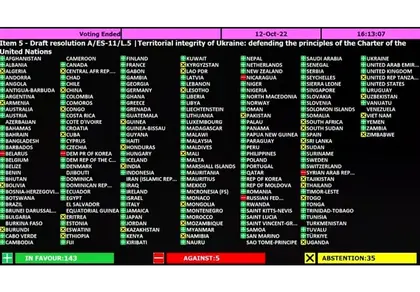The United Nations General Assembly on Wednesday, Oct. 12, overwhelmingly voted to condemn Russia’s annexation of parts of Ukraine, a move US President Joe Biden said sent a “clear message” to Moscow.
The General Assembly approved the resolution with 143 in favor and five against, but 35 nations abstained including China, India, South Africa and Pakistan despite a major US diplomatic effort to seek clearer condemnation of Moscow.
JOIN US ON TELEGRAM
Follow our coverage of the war on the @Kyivpost_official.
The resolution “condemns the organization by the Russian Federation of so-called referendums within the internationally recognized borders of Ukraine” and “the attempted illegal annexation” announced last month of four regions by President Vladimir Putin.
It calls on all UN and international agencies not to recognize any changes announced by Russia to borders and demands that Moscow “immediately and unconditionally reverse” its decisions.
The vote showed Russia that it “cannot erase a sovereign state from the map,” Biden said in a White House statement.
“By attacking the core tenets of the UN Charter, Russia is tearing at the very foundations of international peace and security,” the statement said. “The stakes of this conflict are clear to all — and the world has sent a clear message in response.”
The US ambassador to the United Nations, Linda Thomas-Greenfield, had urged all nations to send a message that the world “will not tolerate seizing a neighbor’s land by force.”

Russia Claims Capture of Two More East Ukraine Villages
“Today it is Russia invading Ukraine. But tomorrow it could be another nation whose territory is violated. It could be you. You could be next. What would you expect from this chamber?” she said.
– International condemnation –
The United States had put special energy into seeking to persuade South Africa and especially India, a growing US partner that has a historically close relationship with Russia and also abstained in the Security Council, where it holds a non-permanent seat.
The vote was largely the same — with a net two more votes against Russia — as when the General Assembly in March condemned the initial invasion of Ukraine.
Bangladesh, Iraq and Senegal — which abstained in March — on Wednesday voted to condemn Russia.
Eritrea, one of the world’s most closed states, moved from a “no” to an abstention, while Nicaragua, under growing international pressure over human rights, switched from abstaining to voting “no” alongside only Russia, Belarus, North Korea and Syria.
“South Africa considers the territorial integrity of states and that of Ukraine to be sacrosanct, and we reject all actions that undermine the purposes and principles of the UN Charter and international law,” said South Africa’s representative, Mathu Joyini.
“We have abstained on the resolution because we believe that the objective of this assembly in keeping with its mandate must always be to contribute to a constructive outcome conducive to the creation of sustainable peace in Ukraine,” she said.
Western powers counter that Russia is not genuinely interested in peace, as witnessed by deadly strikes on civilians in Kyiv and western Ukraine.
India’s envoy, Ruchira Kamboj, said that “the entire Global South has suffered a substantial collateral damage” from the war and that “pressing issues” were not addressed in the resolution.
Bangladesh, explaining its move to condemn Russia, said that the international community should also stand firm against any attempt by Israel to annex occupied Palestinian territory.
“We strongly believe that the purposes and principles of the UN Charter regarding respect for sovereignty and territorial integrity and peaceful settlement of all disputes must be complied universally for everyone, everywhere, under all circumstances,” said Bangladesh’s ambassador, Muhammad Abdul Muhith.
You can also highlight the text and press Ctrl + Enter
Please leave your suggestions or corrections here
Bohdan Nahaylo, Chief Editor of Kyiv Post, is a British-Ukrainian journalist and veteran Ukraine watcher based between Kyiv and Barcelona. He was formerly a senior United Nations official and policy adviser, and director of Radio Liberty’s Ukrainian Service.






